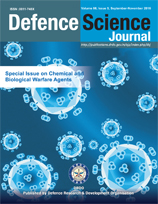Abrasive Water Jet Machining of Carbon Epoxy Composite
DOI:
https://doi.org/10.14429/dsj.66.9501Keywords:
Abrasive water jet machining, carbon epoxy composite, process parameters, surface roughness, kerf taper, delaminationAbstract
An experimental study of abrasive water jet machining of carbon epoxy composite is presented. Process parameters namely hydraulic pressure, traverse rate, stand-off distance and abrasive mass flow rate are considered for this study. Taguchi approach and analysis of variance are used to study the influence of process parameters on response characteristics including surface roughness and kerf taper. It is found that hydraulic pressure and traverse rate are most significant parameters to control surface roughness and kerf taper. Microscopic features of the machined surfaces are evaluated using scanning electron microscope and compared with sample surfaces machined by conventional method using diamond edge cutter.A set of process parameters is optimised to achieve minimum surface roughness and kerf taper. Confirmation tests are performed to verify the optimum set of process parameters. Defects like delamination, fibre pull out and abrasive embedment are also studied using scanning electron microscope.Downloads
Additional Files
Published
2016-09-30
How to Cite
Dhanawade, A., Kumar, S., & Kalmekar, R. V. (2016). Abrasive Water Jet Machining of Carbon Epoxy Composite. Defence Science Journal, 66(5), 522–528. https://doi.org/10.14429/dsj.66.9501
Issue
Section
Materials Science & Metallurgy
License
 Where otherwise noted, the Articles on this site are licensed under Creative Commons License: CC Attribution-Noncommercial-No Derivative Works 2.5 India
Where otherwise noted, the Articles on this site are licensed under Creative Commons License: CC Attribution-Noncommercial-No Derivative Works 2.5 India


